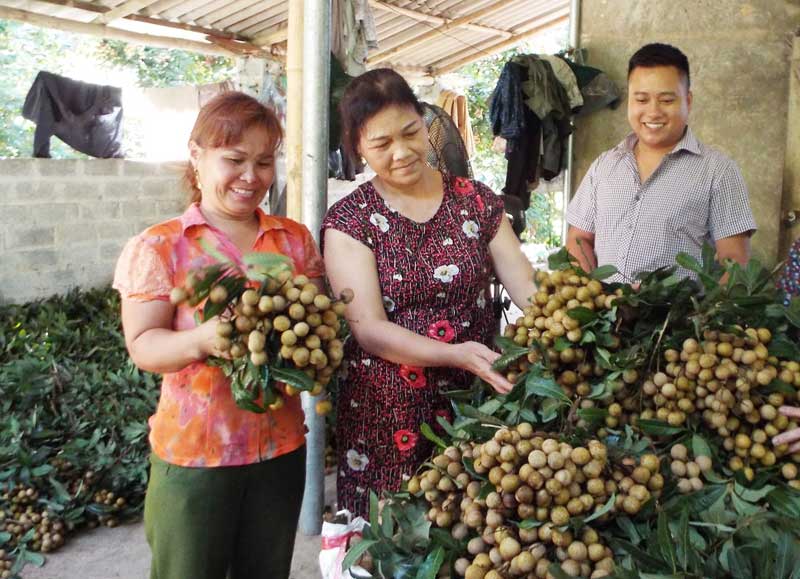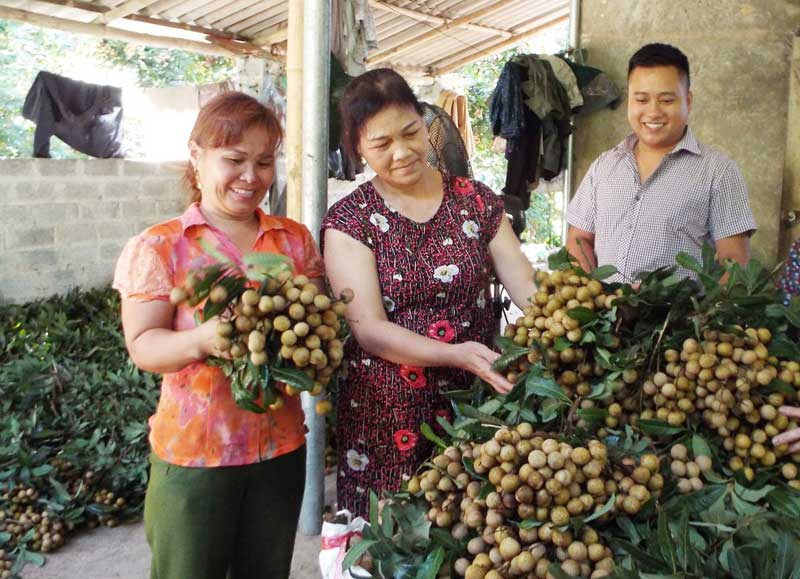
(HBO) – The family of Pham Van Vuong in Khoang hamlet of Son Thuy commune, Hoa Binh province’s Kim Boi district, has been one of the households earning high income from farming longan trees over the last years.
Vuong’s wife, Dao,
said they gained a bumper longan crop with good prices this year. Longan was
sold at over 30,000 VND per kg at the beginning of the harvest season and about
20,000 VND per kg at the end of the season. Profits from longan cultivation are
comparable to orange and grapefruit farming if farmers make appropriate
investment and have good farming techniques.

Pham Van Vuong in Khoang hamlet of Son Thuy commune
(Kim Boi district) earned about 500 million VND (22,000 USD) from this year’s
longan crop.
A cash crop production area has been formed in
Son Thuy commune, and Son Thuy longan is generating an opportunity for many
local families to get rid of poverty and get rich. Dao recounted that 20 years
ago, like many other households in Khoang hamlet, her family faced an array of
difficulties as the farmland area was small and rice farming provided just
enough rice for family consumption. Local people tried to farm different plant
varieties but failed due to unstable sale and prices.
As relatives of her husband were living in Hung
Yen province, known as a longan farming hub, Dao and several households decided
to pilot the planting of longan trees. At first, her family just cultivated
some longan varieties, and they realised that the Huong Chi variety suits the
climate and soil conditions in Son Thuy commune. The family reclaimed their
farmland and used part of the rice farming area to grow longan trees.
They and many other households have also
actively acquired knowledge of farming techniques to raise longan output. Dao’s
family now owns 1ha of longan with 230 trees, which generated the highest ever
productivity this year (25-30 tonnes), earning them 500 million VND.
Son Thuy farmers used to plant various plants,
from watermelon, bamboo to pumpkin, but longan has proved to be most
profitable. Traders from Vinh Phuc province,
Hanoi, Hai Phong city and Nghe An province
have come here to purchase Son Thuy longans, which have thin skin, thick flesh
and soft sweetness. Income from longan cultivation averages 200-300 million VND
(8,800 – 13,200 USD) per ha and can reach 400-500 million VND (17,600 – 22,000
USD) per ha if good farming techniques are used.
Dao added that Khoang hamlet is home to the
largest longan area in Son Thuy commune, about 45ha, most of which has borne
fruit. Many households such as the families of Bui Van Men, Bui Van Luc and Bui
Van Linh have become rich thanks to farming longan. Up to 58 of the 110ha of
longan trees in the commune have borne fruit, generating 700 tonnes worth some
14 billion VND (nearly 616.300 USD). Since Son Thuy longan was recognized as a
collective brand, local farmers have complied with the safe production process
so as to ensure the sustainability of the brand./.
According to data from the Hoa Binh Provincial Party Committee, the industrial production index for the first six months of 2025 is estimated to have increased by 20% compared to the same period last year. This marks the highest year-on-year growth rate for this period since 2020.
In the first six months of 2025, Hoa Binh province’s export turnover was estimated at 1.145 billion USD, marking an 18.11% increase compared to the same period in 2024. Import turnover was estimated at $ 804 million, a 17.15% increase, which helped the province maintain a positive trade balance.
The lives of the ethnic minority farmers in Tan Lac district have gradually improved thanks to the new directions in agricultural production. This is a testament to the collective strength fostered through the professional associations and groups implemented by various levels of the district’s Farmers’ Union.
With the motto the "product quality comes first,” after nearly one year of establishment and operation, Muong village’s Clean Food Agricultural and Commercial Cooperative, located in Cau Hamlet, Hung Son Commune (Kim Boi district), has launched reputable, high-quality agricultural products to the market that are well-received by consumers. The products such as Muong village’s pork sausage, salt-cured chicken, and salt-cured pork hocks have gradually carved out a place in the market and they are on the path to obtaining the OCOP certification.
In the past, the phrase "bumper harvest, rock-bottom prices" was a familiar refrain for Vietnamese farmers engaged in fragmented, small-scale agriculture. But today, a new spirit is emerging across rural areas of Hoa Binh province - one of collaboration, organisation, and collective economic models that provide a stable foundation for production.
Maintaining growing area codes and packing facility codes in accordance with regulations is a mandatory requirement for agricultural products to be eligible for export. Recently, the Department of Agriculture and Environment of Hoa Binh province has intensified technical supervision of designated farming areas and packing facilities to safeguard the "green passport" that enables its products to access international markets.



